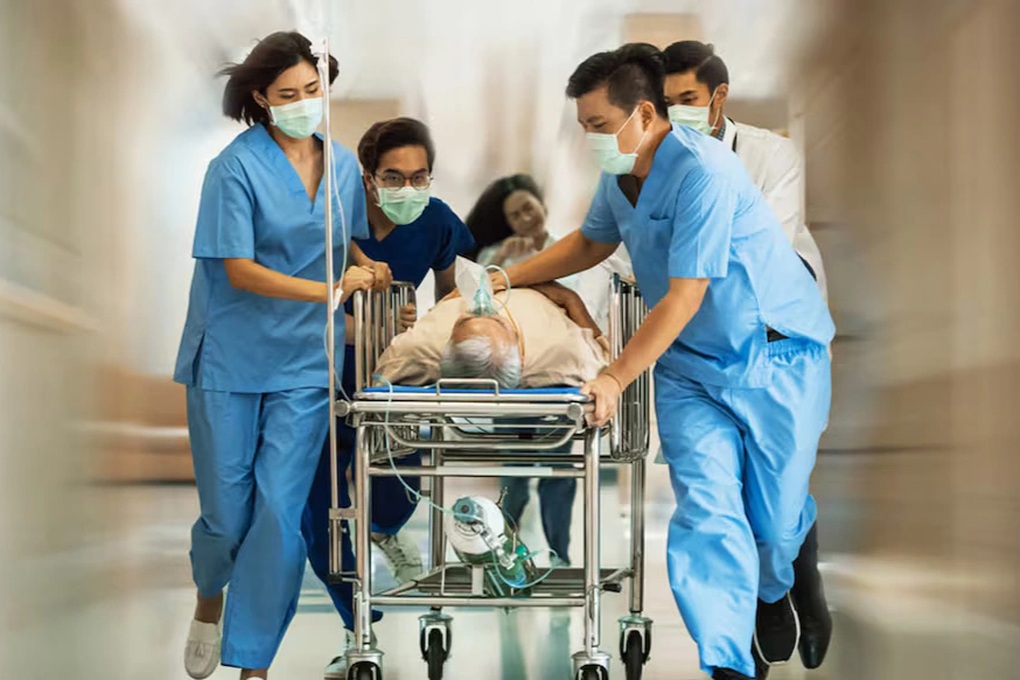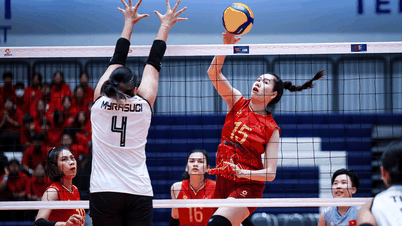Do doctors have to "pay" if patients have not paid the fees?
Sharing with Dan Tri reporter, Dr. Duong Duc Hung, Director of Viet Duc Hospital, said that at Viet Duc Hospital, the emergency treatment process for patients is carried out in accordance with the Ministry of Health 's regulations on emergency treatment.
"The hospital regularly receives serious emergency cases and emergency treatment is always carried out promptly. The patient's life in these situations often determines whether or not the patient's life can be saved.
Therefore, all procedures are shortened to the maximum, focusing on emergency care. Not only that, the best human resources are also mobilized to provide emergency care for patients," Dr. Hung informed.

When receiving emergency care, all procedures are shortened to the maximum to focus on expertise (Illustration: iStock).
Mr. Hung also shared that at the hospital, there are cases where the surgery session has already come, but at this time there is an emergency case, when there is no operating room left, the doctor still has to advise the patient to postpone the surgery session.
Between the two surgeries, emergency surgery and regular surgery, emergency surgery must always be given priority, regular surgery must be stopped for emergency surgery, because this is a surgery for non-critical diseases that do not threaten the patient's life.
Viet Duc Hospital receives hundreds of emergency cases every day, of which 30 are surgeries, all of which are serious.
Regarding concerns about whether the medical team will have to "compensate" the patient if they do not pay the money but proceed with treatment and emergency care if an unexpected situation occurs, the Director of Viet Duc Hospital said that these are very individual situations, and that the situation must be accepted, and the hospital will not hold the doctor responsible for "compensation".
Doctor Le Anh Tuan, Head of the General Planning Department, People's Hospital 115, also emphasized that people should not worry about not having money to receive emergency care.
According to the latest Law on Medical Examination and Treatment (effective from January 1, 2024), it is the patient's right to receive emergency care and the responsibility of medical staff and doctors to ensure this right is fulfilled.
The top priority is still emergency care to ensure the patient's life, there is no delay in emergency care. The hospital's basic principle is not to refuse treatment.
In cases where surgery is required, the hospital will still perform major surgeries even if the patient does not have family support, and will then seek other sources of support.
A doctor working at a large public hospital in Ho Chi Minh City shared some information about the emergency admission process at the hospital.
Accordingly, for patients who are not in critical condition and are accompanied by relatives, relatives need to go to the administrative department to declare information, complete hospitalization procedures, receive a hospital deposit slip and pay.
At the same time, the patient will be initially examined by a doctor, classified and screened for the level of danger. After the examination, the doctor will order additional tests such as tests, X-rays, ultrasounds and prescribe medication if necessary. The nurse or midwife will assist in taking the patient for additional tests. When the results are available, the doctor will continue to treat the patient.
However, for patients who do not have relatives accompanying them or are in critical condition such as low blood pressure, coma, respiratory failure, impaired consciousness, etc., the doctor will prioritize immediate treatment to ensure the patient's life, without waiting for payment in advance. The costs can be paid later by relatives.
If the patient regains consciousness, they will sign the papers and pay the hospital fees. In case the patient is still unconscious and cannot contact relatives, the Social Work Department will coordinate to find relatives through available means such as identification documents, accident location, contact information... at the same time, post a notice to find relatives on media channels and coordinate with the authorities.
In cases where the identity cannot be verified, the patient will be recorded as anonymous (in the West called John/Jane Doe), and the hospital will continue to treat the patient until the patient recovers or dies.
According to this doctor, asking relatives to pay an advance payment is a very common procedure in hospitals. Normally, after being admitted to the hospital, the administrative department will print an advance payment notice and give it to the relatives to pay. This does not mean that the hospital will not handle the case if the patient has not paid, especially in serious emergency situations.
However, in milder cases such as abdominal pain, difficulty breathing but vital signs are stable, the doctor will classify them as not requiring urgent treatment. At this time, the patient may be asked to pay an advance payment before performing further services.
In case the patient has severe symptoms, cannot pay by themselves, and has no relatives, the hospital will perform necessary clinical tests and interventions first.
In cases of surgery or emergency procedures without a guardian, the competent authority will be the hospital manager (during office hours) or the on-duty manager (during on-duty hours). After that, if the family is unable to pay, the hospital will be responsible for paying that portion of the cost.
Sharing more about the case at Nam Dinh General Hospital, this doctor said that there may be a misunderstanding or unclear procedures. For children under 6 years old, health insurance currently covers 100%. If the patient is a child, the remaining cost after insurance is usually insignificant.

Image of a child involved in a traffic accident being taken to Nam Dinh General Hospital for emergency treatment on the afternoon of May 3 (Photo: Cut from video).
It is worth mentioning that the statement "500 is not enough" can cause misunderstanding that the hospital requires payment for emergency treatment. This statement is understandable to cause anger.
"Talking about money is sometimes just a reminder from the administrative department to follow proper procedures, not a prerequisite for patients to receive emergency care," said this doctor.
Importantly, if after being reminded to pay, the patient is still allowed to go for tests and X-rays, it can be understood that the hospital is still operating in the direction of "negative debt" - meaning doing first, calculating payment later - and not refusing emergency care.
According to this doctor, people have a negative view of the medical industry, which can easily lead to misunderstandings about doctors. In fact, many times doctors do not know whether the patient has paid or not, because they prioritize clinical treatment first. The administrative department is the unit that controls hospital fees from patients.
Avoiding paying hospital fees: Extremely rare
According to a leader of the Department of Medical Examination and Treatment Management (Ministry of Health), each year our country has nearly 200 million medical examinations and treatments covered by health insurance. Of these, the number of cases of evasion and non-payment of hospital fees is extremely rare.
If this situation occurs, there is no way that medical staff will have to split this amount to make up for it.
Currently, all hospitals have a Social Work Department to deal with these cases. In special situations, where poor patients cannot pay, doctors will report to the leaders to ask for advice, from which a solution can be found.
The 2023 Law on Medical Examination and Treatment also stipulates 21 prohibited acts in medical examination and treatment activities. Among them, there is the act of refusing or intentionally delaying emergency treatment for patients.
In the case of medical examination and treatment for people without relatives, the medical facility is responsible for inventorying, making records and keeping the patient's assets.
Within 48 hours of receiving the patient and still unable to identify the patient's relatives, the facility is responsible for notifying the People's Committee of the commune to announce the search for the patient's relatives on the mass media.
At the same time, prepare a dossier to request the admission of social protection beneficiaries with especially difficult circumstances to social assistance facilities according to the provisions of the law on social protection for children under 6 months old abandoned at medical examination and treatment facilities.
In case the patient has been treated stably but still cannot identify relatives and is in a case of loss of civil act capacity, difficulty in cognition, behavior control, or limited civil act capacity, the medical examination and treatment facility is responsible for preparing a dossier to request the admission of social protection beneficiaries with especially difficult circumstances to social assistance facilities according to the provisions of the law on social protection.
The Government shall prescribe the payment of expenses for nurturing, caring for, examining and treating patients specified in this Article.
Source: https://dantri.com.vn/suc-khoe/cap-cuu-khong-cho-dong-tien-bac-si-noi-gi-ve-quy-trinh-xu-tri-benh-nhan-20250507102741324.htm



































































































Comment (0)